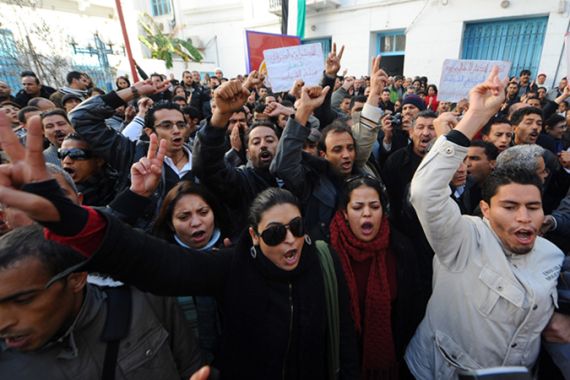Protesters killed in Tunisia riots
Fatalities reported after fresh clashes between demonstrators and security forces across north African nation.

Several people have been killed in clashes with police in different parts of Tunisia.
Union sources told Al Jazeera that six people were killed and another six wounded in the city of Tala, 200km southwest of the capital Tunis, on Saturday after security forces opened fire on protesters.
Another 14 people were killed in similar clashes in the Kasserine region, the sources said.
Tunisia official media said on Sunday that there had been 14 deaths in the past 24 hours in Tala, Kasserine and Rgeb.
Several police officers were wounded in the clashes, some of them seriously, according to the official TAP news agency.
Belgacem Sayhi, a teacher and trade union activist, told the AFP news agency that the victims in Tala were between 17 and 30 years old, and were killed when the police opened fire on the crowd.
|
An employee at a hospital in Tala told Reuters that several people were admitted to the hospital after the clashes, and other witnesses said that six people who were in critical condition had been moved to the regional capital, Kasserine.
Witnesses said police fired their weapons after using water cannons to try to disperse a crowd which had set fire to a government building.
The crowd also threw stones and petrol bombs at police.
Defending its actions, a government statement said: “The police opened fire in legitimate self-defence and this led to two dead and eight wounded, as well as several wounded among police, three of them seriously.”
A press blackout has made confirming witness accounts difficult, but Al Jazeera has been sent a considerable number of disturbing, grisly images of what appear to be injured and dead protesters via social media.
There had already been unrest in Tala on Friday, with protesters attacking a bank and official buildings, and setting them on fire, Sadok Mahmoudi, a union leader, told AFP news agency.
Paris explosion
In a related development, French police confirmed that a “small explosion” occurred at the Tunisian consulate in a Paris suburb early on Sunday morning.
The blast took place at the consulate in Pantin, and caused “minor damage to the consulates metal shutters”, police said.
 |
| More on the story on Al Jazeera’s Tunisia spotlight page |
Raouf Najar, Tunisia’s ambassador to France, said in a statement: “The disinformation these past few days on what is happening in Tunisia is such that anything is possible, even this terrorist act.”
The consulate reopened for business later on Sunday morning, with a police guard posted outside.
On Saturday, troops were deployed to the area for the first time since the start of the recent wave of unrest which has been in protest at high levels of youth unemployment.
The soldiers were assigned to protect public buildings, said Mahmoudi.
Protests sparked by high youth unemployment have spread from the central town of Sidi Bouzid to other parts chiefly in the north African country’s interior, which lags behind the more prosperous coastal areas.
Union protest
On Saturday, the Tunisian General Union of Labour (UGTT), the country’s main union, condemned the authorities for their heavy-handed response to protesters.
Several hundred UGTT members gathered in Tunis to observe a minute’s silence for those who have died since protests began.
“We support the demands of the people in Sidi Bouzid and interior regions,” said Abid Brigui, deputy general secretary of the union, which is considered to be close to the government.
Last week, a 26-year-old Tunisian man who set off a wave of protests after attempting to commit suicide by setting himself on fire last month died of third-degree burns in hospital.
Zine al Abidine Ben Ali , the Tunisian president, has said the violent protests are unacceptable and could harm the country’s interests by discouraging investors and tourists who provide a large part of the country’s revenues.
Protests traditionally have been rare in Tunisia, which has had only two presidents since independence from France 55 years ago.
The country has in the past been praised by Western allies as a model of stability and prosperity in the Arab world.
Al Jazeera is not responsible for the content of external sites.